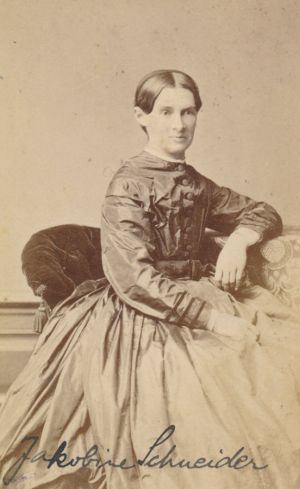Translations:Jacobine Schneider (Da VII 3)/3/en
Short biography about Jacobine, written down by her daughter Babette Schneider, from the Chronicle of the Eckart Family (F-S346), compiled by Otto Eckart in 1927, part handwritten and part typed:
My dear mother, Jakobine Schneider, née Eckart, was born on January 1, 1829, in Emskirchen as the third child of David Eckart and his wife Jeanette.
She spent her childhood and schooldays at her parents’ house, surrounded by her numerous siblings whom she and her elder sister Jette took care of. In doing so, she became a support for her very busy mother. She also spent many pleasant hours in the house of her father’s wards, clergyman Oertel’s deaf-mute orphans, who particularly Hanne had grown fond of. After finishing Sunday school, she learned to cook in Nuremberg and then helped her mother in the household again.
In 1850, the 21-year-old started work as housemother in the orphanage Karolinenfeld, near Greiz in the former Principality of Reuss. Here, for ten years she carried out her duties to the utmost satisfaction of Princess Karoline, the foundress of the institution. This is where she became acquainted with her future husband, Johann Georg Schneider, who, as housefather, oversaw the boys’ department of the same institution for several years. [At this point, one page is missing in the pdf file or the document.]
… to take us to acquaintances in the Steigerwald region: One heard the roar of the cannons from morning to night and lived in fear that the detested Prussians would appear. Finally, Bavarian soldiers were accommodated there under whose protection we felt safe.
Following the christening of little Susanne, grandmother moved there with Aunt Tina and the grandchildren; aunt stayed there until her wedding; grandmother until her death. She always spent the summer with one of her children. I was also allowed to come to Emskirchen on account of school and spent two happy years there.
In the year 1866, my parents took over a leasehold in Berchtshofen, near Windsheim, as Uncle Blaufuss wanted to personally take care of the institution in Mutschenhof. Upon the advice of Uncle Johannes, the parents moved to Munich, at that time notorious and dreaded as a typhoid fever hotspot, in the spring of 1868. For this reason, mother categorically refused to move to the inner city. Therefore, Uncle Johannes found a spacious dwelling with bright, high-ceilinged rooms and a big garden for them on the street, which was formerly called Sternwartstrasse, in Bogenhausen, then a village near Munich. This house, which still existed in 1901, has now been replaced by Villa Ludovici. Mother quickly acclimatized to her new home as she was able to cultivate the garden and keep chickens like she did before. Father, however, started work as a supervisor in the mineral water factory owned by Uncle Fritz’ longtime friend Friedrich Seyboth, who later became Kommerzienrat (an honorary title for distinguished businessmen).
In autumn 1868, I also came to Munich and attended the, in those days, only Protestant school, located at the Glockenbach brook (now the street Georg Wilhelmsstrasse). During the week, I stayed with Uncle Johannes and Aunt Susanne at the square Salvatorplatz; on Saturdays, I was allowed to go home with father. During Advent, I was ill when I came to Bogenhausen and, shortly afterwards, we four children and mother were ill with typhoid fever. The street in front of our house was closed by the police due to a typhoid fever epidemic and the case, which attracted a lot of attention, appeared in the newspapers: thanks to good care, our robust constitution and the airy dwelling, we all recovered; only mother’s hair, which used to be blond, turned black after the recovery.
In autumn 1869, my parents moved to the city, and we lived at the square Gärtnerplatz N 1, and later in the street Rumfordstrasse 39. Cholera passed us by, but in 1872, my three siblings fell ill with scarlet fever, which claimed the life of my little siter, who was the youngest, on March 17. My sister Minette suffered greatly from the resulting illnesses (dropsy, etc.), but recovered, even though the doctors had given up hope. Could it have been the remedies of the peasant woman healer, the last person that my father went to, that helped? Nobody knows.
